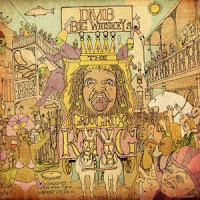
Dave Matthews Band - Big Whiskey And The GrooGrux King
Release date: June 2, 2009
Dave Matthews Band’s seventh studio album, 2009’s Big Whiskey And The GrooGrux King, is one of those albums that will always be remembered not for the music, but for the circumstances surrounding its release. Midway through the process of writing and recording the album, the Virginia-native band was struck by the sudden and tragic death of founding member and master saxophone player LeRoi Moore. It was a devastating blow, shaking both the band and its dedicated fan base to their respective cores. The loss of a musician so vital to the sound of a band would surely have crumbled any lesser group, but DMB didn’t give up. In fact, if Moore’s death has affected the band’s music in any way, it seems to have revitalized it - Big Whiskey is brimming with more energy and musical flair than anything the band has released in the last decade.
One of the most enduring criticisms of Dave Matthews Band’s studio catalog is that the material never quite captures the energy of the band’s live shows. The band has built their career on touring, and rightly so - few bands put on a better show than DMB at their finest. Measuring up to the jubilant spectacle of their concerts is no small feat for a studio recording, and while Big Whiskey doesn’t quite reach the mark, it comes closer than any album the band has released since at least 1998’s Before These Crowded Streets. Instead of being stifled by the studio environment as on much of the band’s recent output (especially on 2005’s disappointing Stand Up), the performances here are lively and virtuosic. Drummer Carter Beauford in particular is in top form, delivering what might be the most impressive studio recording of his career. Beauford’s explosive, intricate rhythms form the foundation upon which the rest of the band builds one sonic spectacle after another, utilizing to their full extent Stefan Lessard’s bass, Boyd Tinsley’s violin, and - what might be the most striking characteristic of the album - lots and lots of guitars, courtesy of both Dave Matthews himself and his longtime collaborator Tim Reynolds (appearing for the first time on record with DMB since Crowded Streets). The overall sound is bold, raw, and unapologetic, with tracks such as “Why I Am,” “Shake Me Like A Monkey,” “Alligator Pie,” and “Squirm” guaranteed to translate perfectly to the band’s live shows.
Of course, while the album is overshadowed in many ways by Moore’s passing, he is far from absent from the final product. The band went to great lengths to include as much recorded material from Moore’s final sessions as possible, resulting in some of the album’s best moments. The very first notes of Big Whiskey are Moore’s soulful saxophone intro, leading into the album’s instrumental first track, “Grux.” The somber “Lying In The Hands Of God” prominently features Moore’s distinctive soprano sax, providing a playful counterpoint to Matthews’ vocals. Most of the rest of the album’s songs contain at least a fill or a solo recorded by Moore before his death, making the album a fitting memorial to his talent and creative voice. Jeff Coffin and Rashawn Ross, on saxophone and trumpet, perform the rest of the album’s horn parts. Although their talent is beyond question, they never quite fill the space left vacant by Moore’s death, making his absence all the more apparent - and perhaps reminding the listener of Moore’s indispensable place in the band in just one more way. Big Whiskey is an album that works on multiple levels: as a tribute to a fallen musician, as a triumphant return to form for the remaining band members, and simply as a fun, exciting, and wholly satisfying musical experience. Even if you can’t make it to a DMB concert this summer, pick up this album - it’s the next best thing, and that’s saying a lot. Highly recommended.
4/5
Standout Tracks:
- “Shake Me Like A Monkey”
- “Lying In The Hands Of God”
- “Squirm”
- “Why I Am”







